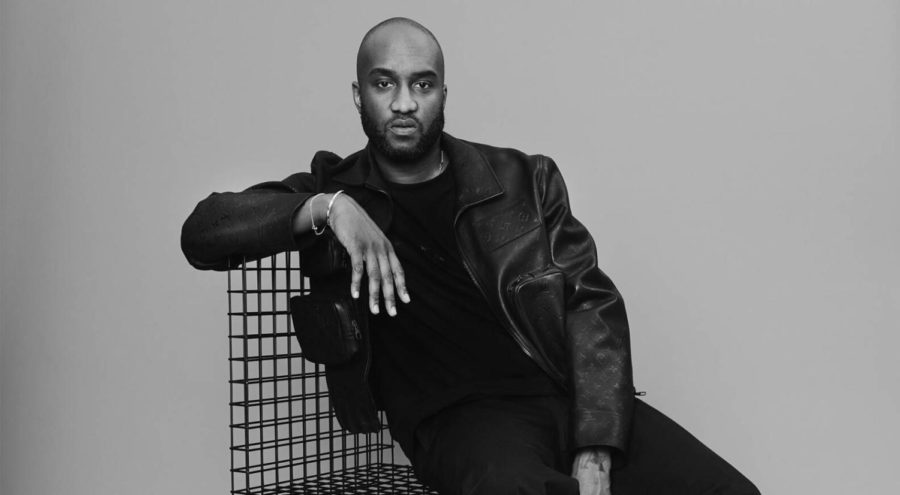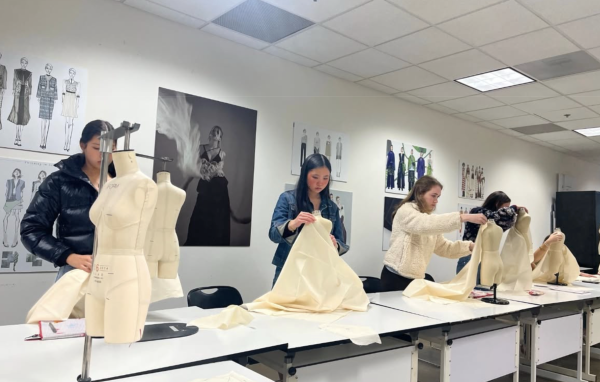Remembering Virgil Abloh: Fashion trailblazer
African American designer Virgil Abloh, setter of precedents in the fashion industry and mentor to several personalities, was confirmed dead on Nov. 28, 2021, stunning the industry and consumers across the world. He passed at the young age of 41, after two years of fighting a rare form of cancer known as cardiac angiosarcoma. His legacy touches the hearts of millions and resonates with people around the world.
Abloh was born in Rockford, Illinois, to his Ghanaian parents. His mother was a seamstress and taught him to sew, and his father managed a paint company. After attending Boylan Catholic High School, Abloh graduated from the University of Wisconsin-Madison with a degree in civil engineering and then received a master’s degree in architecture at Illinois Institute of Technology in 2006. While studying architecture at IIT, he found joy in designing t-shirts and started writing about fashion in a blog called The Brilliance. Soon, he realized that he was more passionate about fashion, so he moved away from a future career in architecture to cultivate his newfound passion for clothing design.
In 2009, Abloh met rapper Kanye West in Rome, Italy, when they interned together at Fendi’s Italian luxury brand. The two quickly developed a close and collaborative friendship. West later appointed Abloh to be the creative director for his Donda line. Abloh’s relationship with Kanye West launched his career in the fashion industry and ultimately led to Abloh’s worldwide recognition as a designer.
Abloh’s creativity and distinctive style caught the attention of the CEO of Louis Vuitton, Michael Burke, which led to his later involvement with that luxury fashion brand. By 2013, Abloh established his hybrid brand, Off-White, which successfully merged high fashion with streetwear culture. Despite the new brand’s versatility and its undeniable street appeal, Abloh insisted on establishing Off-White as an exclusive designer brand.
“I was adamant: this isn’t a streetwear brand,” said Abloh. “This isn’t a contemporary brand. This is designer, just the same way that X, Y, Z are designers, where you say their name, and it carries this whole esteem and emotion to it.”
Abloh’s career continued to grow. By 2018, he was leading the menswear collection at Louis Vuitton, making him the third African American artistic director at a French luxury fashion house and the first at Louis Vuitton. His introduction of hip-hop and rap-inspired designs into the collections of Louis Vuitton brought a fresh perspective on the fashion scene and created a new brand image that appealed to the new, younger generation. Abloh dedicated his work to his younger self in hopes of leaving a legacy in his field.
“Everything I do is for the 17-year-old version of myself,” said Abloh. He firmly believed “in the power of art to inspire future generations.”
As Abloh successfully pursued his career, he also became a supportive mentor to several personalities in the art, music, and social worlds, encouraging them to step outside the norms of the art world. The mentees joined the internet in a wave of recognition, gratefulness, and love after Abloh’s passing.
“Abloh,” said hip-hop artist Tyler Gregory Okonma, known by the stage name of Tyler the Creator. “That strong African last name. [A] few years back, I started using more of my African last name, Okonma, because of how regal Virgil’s felt. Everything he did felt like he said, ‘Hey over here, the coast is clear,’ whenever I questioned things.”
Abloh’s confidence and trail-blazing personality inspired millions to live outside of the box, break social boundaries, and amplify the African American voices of the youth.
“Virgil was not only a genius designer, a visionary, he was also a man with a beautiful soul and great wisdom,” said Bernard Arnault, the chairman of Moët Hennessy Louis Vuitton.
Abloh’s success and worldwide recognition as an African American creator inspired and impressed a wide variety of people, including those in the Westminster community.
“In terms of representation, when I think about the broader community, I relate to Virgil Abloh,” said Upper School visual arts teacher Michael Reese. “There aren’t many African American men in K-12 education. I see myself as an outsider to Westminster culture, and being an outsider has been a strength.”
As one of the few male African American designers, Abloh was able to bring an outsider’s perspective that contributed to his role in revolutionizing the fashion industry.
“There are certain rules and parameters that need to be looked at differently, and being an outsider helped me to see where change is sometimes needed,” said Reese. “If you are in a system, what needs to be changed is not always visible.”
Abloh became widely known as a visionary who worked to break societal stereotypes throughout his career. Dubbed a “disruptor” by the media, Abloh confidently blurred the line between streetwear and high-fashion contemporary.
“He brought streetwear to high fashion as well as the idea of luxury and hype to collaborations,” said senior Jordan Sgrosso, one of the Westminster fashion club leaders. “[Abloh] was very transparent of what he was inspired by and used those quotations to show how he was making something already created contemporary.”
Consumers and the media readily embraced Abloh’s new and unprecedented ideas. He created pieces that made a statement and had a name brand but left behind the norms and standards of designer clothing.
“I think that because Abloh was not of the fashion world in the traditional sense, he was able to, by not knowing the rules, flip the perspective of what was cool,” said Reese.
Abloh’s avant-garde, creative style will forever leave a footprint in the fashion industry. His proud and innovative mindset has left a mark on the hearts and minds of millions.




